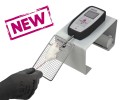Authors
J Gao, L Wang, C Gao, H Arakawa, G Perry, X Wang
Lab
Department of Pathology, Case Western Reserve University, Cleveland, OH, USA.
Journal
Biochimica et Biophysica Acta (BBA) - Molecular Basis of Disease
Abstract
Alzheimer's disease (AD) is the leading cause of dementia in the elderly, characterized clinically by progressive decline in cognitive function and neuropathologically by the presence of senile plaques and neuronal loss in the brain. While current drugs for AD are always employed as symptomatic therapies with variable benefits, there is no treatment to delay its progression or halt neurodegeneration. TAR DNA-binding protein 43 (TDP-43) proteinopathy has increasingly been implicated as a prominent histopathological feature of AD and related dementias. Our recent studies have implicated mitochondria as critical targets of TDP-43 neurotoxicity. Here, we demonstrate that the suppression of mitochondrial-associated TDP-43 protects against neuronal loss and behavioral deficits in 5XFAD transgenic mice recapitulating AD-related phenotypes. In AD patients and 5XFAD mice, the level of TDP-43 is increased in mitochondria, and TDP-43 highly co-localizes with mitochondria in brain neurons exhibiting TDP-43 proteinopathy. Chronic administration of a TDP-43 mitochondrial localization inhibitory peptide, PM1, significantly alleviates TDP-43 proteinopathy, mitochondrial abnormalities, microgliosis and even neuronal loss without effect on amyloid plaque load in 12-month-old 5XFAD mice well after the onset of symptoms. Additionally, PM1 also improves the cognitive and motor function in 12-month-old 5XFAD mice and completely prevents the onset of mild cognitive impairment in 6-month-old 5XFAD mice. These data indicate that mitochondria-associated TDP-43 is likely involved in AD pathogenesis and that the inhibitor of mitochondria-associated TDP-43 may be a valuable drug to treat underlying AD.
BIOSEB Instruments Used:
Grip strength test (BIO-GS3)

 Pain - Thermal Allodynia / Hyperalgesia
Pain - Thermal Allodynia / Hyperalgesia Pain - Spontaneous Pain - Postural Deficit
Pain - Spontaneous Pain - Postural Deficit Pain - Mechanical Allodynia / Hyperalgesia
Pain - Mechanical Allodynia / Hyperalgesia Learning/Memory - Attention - Addiction
Learning/Memory - Attention - Addiction Physiology & Respiratory Research
Physiology & Respiratory Research
 Pain
Pain Metabolism
Metabolism Motor control
Motor control Neurodegeneration
Neurodegeneration Cross-disciplinary subjects
Cross-disciplinary subjects Muscular system
Muscular system General activity
General activity Mood Disorders
Mood Disorders Other disorders
Other disorders Joints
Joints Central Nervous System (CNS)
Central Nervous System (CNS) Sensory system
Sensory system
